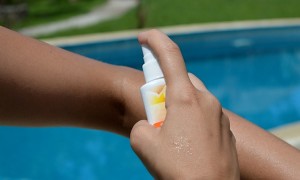Insect Repellent is the New Sunscreen
With Zika virus outbreaks raising concerns about mosquito-borne illnesses, using insect repellent to prevent bug bites has become just as important as avoiding sunburn when enjoying the great outdoors.
Focusing on preventive care, Doctors of Osteopathic Medicine, or DOs, consider how environmental and lifestyle factors impact your health. That is why DOs recommend incorporating mosquito repellent into your daily warm weather routine to help prevent the infection and spread of nearly a dozen illnesses caused by those pesky bites.
Global travel means diseases carried by mosquitos in other parts of the world can rapidly become a concern in the United States. Domestic mosquitos can spread diseases to home regions when they bite an infected individual who has recently returned from an infected area, says Ann T. MacIntyre, a Miami-based osteopathic physician specializing in infectious diseases.
“I recommend using insect repellent wherever there are active mosquitos to protect against mosquito-borne illnesses, which can have devastating consequences for some patients,” Dr. MacIntyre says.
Preventing Mosquito Bites
Avoiding mosquito bites is the best way to prevent diseases, including Zika virus, West Nile virus, dengue, chikungunya and malaria, all of which have been reported in the United States. While the current focus is on the Zika virus because of its association to severe birth defects and Guillain-Barre syndrome, it’s important to understand that mosquito bites aren’t an unavoidable nuisance; they’re a public health hazard, Dr. MacIntyre adds.
The Centers for Disease Control and Prevention recommends taking these precautions to help prevent mosquito bites:
- Use an Environmental Protection Agency registered insect repellent containing DEET, Picaridin, oil of lemon eucalyptus or IR3535, which are safe for children and pregnant women, according to the CDC.
- Wear long sleeves and pants when the weather permits.
- Keep mosquitos outside by using air conditioning and/or window and door screens.
Where Are Mosquitos?
Geography is increasingly less relevant in terms of managing your risk for mosquito-borne diseases, according to Mia Taormina, DO, FACOI, an osteopathic infectious disease and travel medicine specialist at DuPage Medical Group.
There are about 200 different species of mosquitos in the United States, all of which have specific habitats and bite behaviors. Knowing the peak bite times of the local mosquito population can help people stay safe and enjoy warm-weather activities.
Based on your travel destination know that:
- Zika-carrying mosquitoes in Central and South America are daytime biters, so you can hike and bike in low-brush areas at dusk or dawn to limit your risk.
- Feeding patterns are opposite in much of the Midwest, where the evening hours pose the highest risk.
“To help prevent disease caused by bites, I partner with my patients to develop an outdoor activity strategy specific to their destination,” Dr. Taormina adds.

